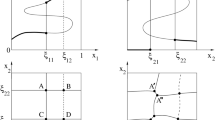Abstract
Open-loop Stackelberg equilibria in linear-state games are subgame perfect. This result holds under the hypothesis of unconstrained final state; whereas we need to take into account suitable final-state conditions in order to correctly formalize certain economic problems. A striking contribution of this paper is that it tackles the consistency problem for an open-loop Stackelberg equilibrium in linear-state games with a final-state constraint in the leader’s problem. In this paper, after proving that such a type of equilibrium is not subgame perfect, we introduce a weaker definition of subgame perfectness, which we call ε-subgame perfectness. This new definition can be applied to the open-loop Stackelberg equilibrium of a constrained linear-state game. Finally, we present some explanatory examples to show how the definition of ε-subgame perfectness can be meaningful.


Similar content being viewed by others
References
Başar T, Olsder GJ (1999) Dynamic noncooperative game theory. Classics in applied mathematics, vol 23. Society for Industrial and Applied Mathematics (SIAM), Philadelphia. Reprint of the second (1995) edition
Buckdahn R, Cardaliaguet P, Quincampoix M (2011) Some recent aspects of differential game theory. Dyn Games Appl 1(1):74–114
Cellini R, Lambertini L (2008) Weak and strong time consistency in a differential oligopoly game with capital accumulation. J Optim Theory Appl 138(1):17–26
Cellini R, Lambertini L, Leitmann G (2005) Degenerate feedback and time consistency in differential games. In: Hofer EP, Reithmeier E (eds) Modeling and control of autonomous decision support based systems, proceedings of the 13th workshop on dynamics and control. Shaker, Aachen, pp 185–192
Dockner EJ, Jørgensen S, Van Long N, Sorger G (2000) Differential games in economics and management science. Cambridge University Press, Cambridge
Grass D, Caulkins P, Feichtinger G, Tragler G, Behrens DA (2008) Optimal control of nonlinear processes. With applications in drugs, corruption, and terror. Springer, Berlin
Jørgensen S, Martín-Herrán G, Zaccour G (2010) The Leitmann–Schmitendorf advertising differential game. Appl Math Comput 217(3):1110–1116
Seierstad A, Knut S (1987) Optimal control theory with economic applications. In: Advanced textbooks in economics, vol 24. North-Holland, Amsterdam
Takayama A (1985) Mathematical economics. Cambridge University Press, Cambridge
Acknowledgements
We thank Michèle Breton for the useful and heartfelt suggestions given to the authors during the Third Workshop on Dynamic Games in Management Science at HEC Montreal. The clarity of the paper has definitely been improved by the precise comments of the referees.
Author information
Authors and Affiliations
Corresponding author
Rights and permissions
About this article
Cite this article
Buratto, A., Grosset, L. & Viscolani, B. ε-Subgame Perfectness of an Open-Loop Stackelberg Equilibrium in Linear-State Games. Dyn Games Appl 2, 269–279 (2012). https://doi.org/10.1007/s13235-012-0046-7
Published:
Issue Date:
DOI: https://doi.org/10.1007/s13235-012-0046-7




